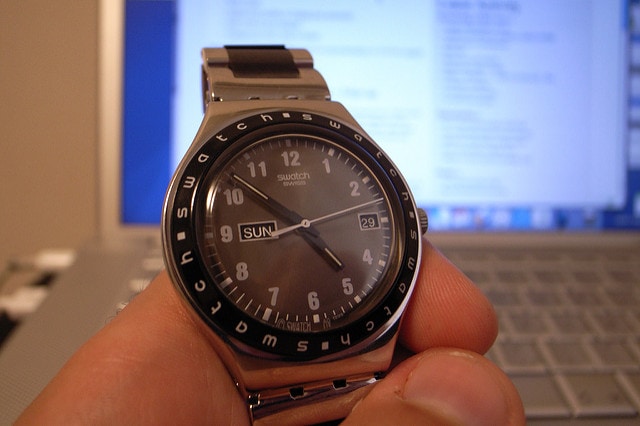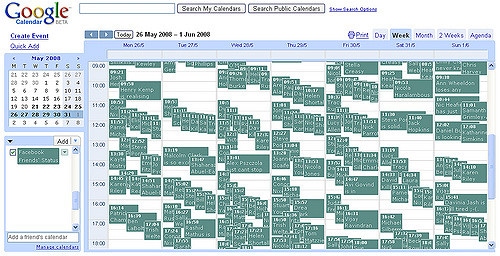
The 11th-hour hits. You get self-loathing panicky feelings as sleep-deprived you watches the sun rise with an untouched assignment. As a fellow procrastinator, you have my condolences.
Procrastination is terrible because it can overshadow the strengths of an otherwise normal ‘ole person. You kick yourself for turning in quality work late or sub-par on-time or having to do marathon work sessions because you wasted time. You also hate how constantly unhealthy you feel. You can’t concentrate in class because you’re not sleeping, have a terrible diet, and consequently have no energy.
You’ve probably read blogs and books about how to get over procrastination. Thing is, those pieces always seem like they’ve been written by people who aren’t true procrastinators. It’s time to acknowledge the people in between Points A and B…. A being those who are in total denial over how procrastination is impacting their lives and B being the non-procrastinators. Middle people still procrastinate the majority of the time but have engineered ways to avoid ruining their lives.
Here, we talk about being in the middle of the procrastinator spectrum. You might never stop procrastinating entirely, but that’s okay. Learn about yourself, what you want, and how you work. Take advantage of self-knowledge. Do better but also forgive yourself for slip-ups. As Mindy Kaling says,
“I’m constantly in a state of self-improvement but I don’t beat myself up over it.”
Here are some tips to help you survive – and function well – even if you default state is “putting everything off”:
Table of Contents
Know What You Do

What is your non-negotiable?
Look at what you hate your procrastinating self the most for. Pick one of these three and address it. The options are:
- Hurting your health
- Endless work sessions
- Turning in sub-par work on-time/quality late
This is what you’re going to spend all your fighting power on. Stopping procrastination isn’t the end goal here; it’s not screwing up your non-negotiable.
What are you NOT going to do?
Let’s get the obvious answer out of the way: don’t tell yourself you’re going to stop procrastinating. If you’re a chronic procrastinator, it most likely works for you — maybe not well, but it has worked well enough despite its messiness.
You look at the intensely complicated calendars and to-do lists of people who have managed to conquer their Instant Gratification Monkey (shoutout to Wait But Why for the best personification names) and immediately go: NOPE. Follow that instinct. Don’t go down the productivity porn rabbit hole of tinkering with productivity systems and not actually working.
What do you do well?
Every procrastinator has something they kick butt at. Maybe you always get your laundry done before the inevitable pile-up or always turn in your library books on time. Those are wins. Most likely you’re good at those things because you have a non-negotiable hook that you’ve linked to a visible habit.
Wearing clean clothes and not paying late fees are your non-negotiables here. Laundry gets done because you only own so many clothes and you’ve gotten into a routine of doing it every two weeks as your clean clothes run out. You turn in your library books on time because you stack them in a visible spot and place money as a reminder of late fees.
The point? To remind yourself that you’re not totally useless or broken – you are able to do some things well, and you can improve at others. Remember your wins and use them to propel yourself forward.
Doing What You Do – But Better
Below, I’ve laid out a battle plan for each of the three non-negotiables. Again, I want you to pick one of these to work on. When you master it, it’s OK to pick another. But the enemy of a procrastinator is overload. You’ll only sabotage your efforts by taking on too many changes at once.

Hurting your health? Make small healthy choices.
Procrastination impacts your health just as much as work. Sleep-deprivation, pushing off doctor visits, rationalizing “oh one day of eating tons of junk food is fine, I’ll do better tomorrow” are all forms of procrastinating your health.
Choose one area of your health that is a non-negotiable. Pick a simple method that you would be good at turning into a habit. College is infinitely easier to survive when you’re healthy. Have visible checkpoints throughout your day.
Want to get better at eating healthy? Eat a plant at every meal.
Want to get better at exercise? Avoid the elevator and take the stairs every time
Want to sleep better? Use sleepyti.me, a bedtime calculator, and try to sleep at least one cycle earlier. Learn to take naps with your head down on a desk instead of “taking a nap” for 5+ hours when you crash on your bed.
Endless work sessions? Incentivize your studying.
You normally turn in quality work on-time but you loathe having to do 9+ hour work sessions at once to get it done because you procrastinated. You take a lot of short breaks and end up finishing at midnight instead of 4 hours earlier. Sound familiar?
Rule of thumb: Give yourself an incentive of a LONG break doing something you really want to do. Procrastinators take a lot of short breaks but then realize they spent all those breaks unsatisfied. Long breaks are the answer.
The long break should be 20% of how long you’ve worked. Decide on your break length first, then how long you’re going to work to earn it. Want 45 minutes to sit down and enjoy a show episode? Work 3 hours and 45 minutes for it.
This eliminates the short work/break cycles that end up amounting to an entire day spent working with breaks that feel disappointing. You don’t want to feel like you worked all that time for no real reward, even if you got good work in on-time.
One helpful method is to use a day chart divided into 30 minute increments. Color it in: red for every work block, blue for satisfying break time, green for BS breaks. You still get reds no matter how much you’ve worked – but you only get blues (which you really want, remember) if you’ve worked for them.
Turning in sub-par work on-time/quality late? Try variable deadlines.
Either you struggle with sub-par work on-time or quality work in late. In this scenario, your work is probably never where you’d like it to be.
The solution? Give yourself variable deadlines. There’s a lot of advice out there about setting too-early deadlines for yourself – do that, except don’t give your early deadlines any pattern. Set some a day early, others 3 days early, and throw in a few accurate deadlines as well.
Use a random generator to choose the early deadline (0-accurate, 1-1 day early, etc.) or let friends input them. Even if you procrastinate and start the day of your self-imposed deadline, you’ll most likely finish that day, too because you have no idea what the actual deadline is. Try it – you’ll be surprised at how well it works!
How have you survived college as a procrastinator?
Now that you’ve seen my tips, I want to hear from my fellow procrastinators!
What are your non-negotiables? Have any tried-and-true strategies that work? How do you keep it all together? Let’s discuss in the comments.
